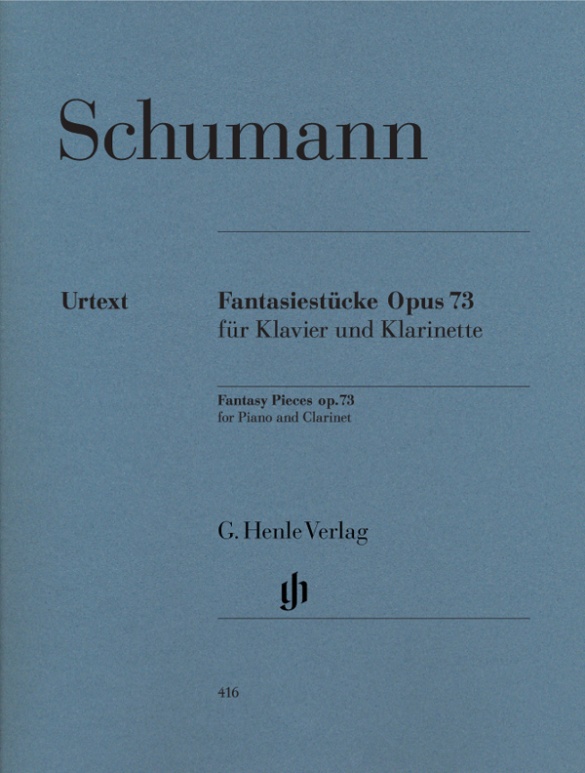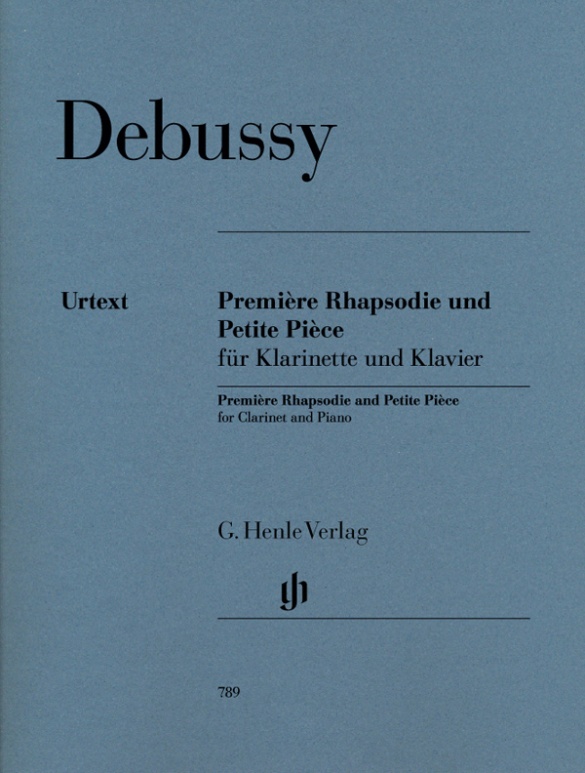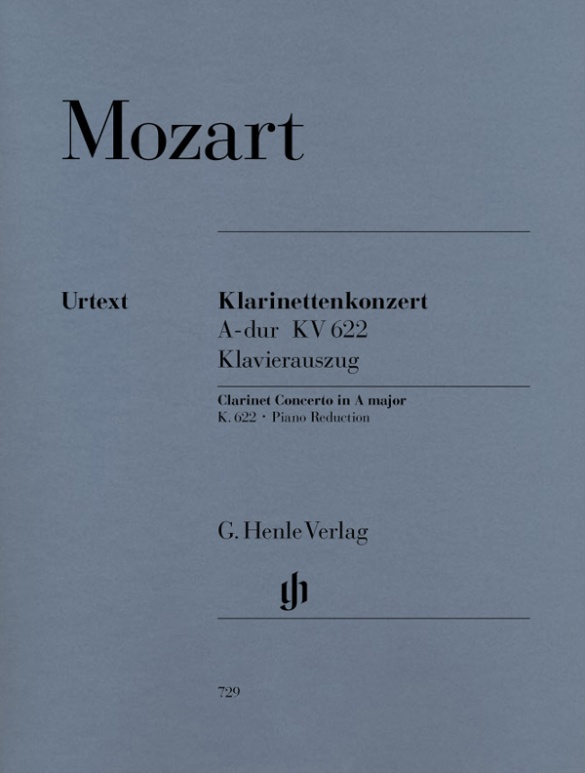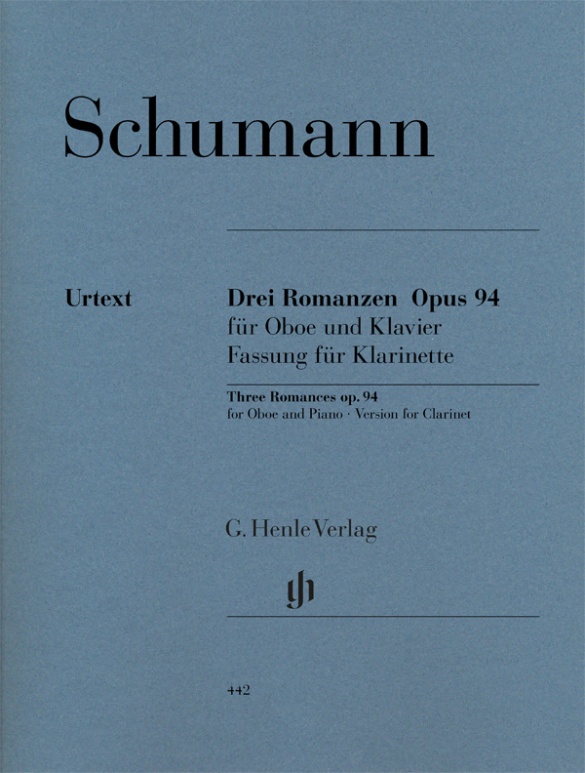

Robert Schumann
Three Romances op. 94 for Oboe and Piano
Robert Schumann in fact composed just one work for the clarinete, namely the “Drei Fantasiestücke” op. 73 for clarinet and piano of February 1849. But the “Drei Romanzen” op. 94 for oboe, written at the end of that same year, were marketed with solo parts for clarinet and for violin too.
Clarinettists are certainly delighted that G. Henle Verlag is following this principle of alternative scoring. The manuscript that Robert gave to his wife Clara in 1849 as a Christmas gift does not survive. Instead, autograph sketches have been consulted for our Urtext edition, and these have enabled correction of some irregularities in the 1851 first edition. The editor’s preface and commentary give extensive information on textual questions.
Content/Details
About the Composer
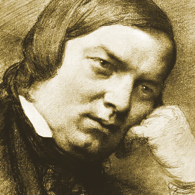
Robert Schumann
Connected with his oeuvre is the term he coined, Poetic Music, with which he strove for a fusion of literature and music, a paradigm particularly seen in his lyric piano pieces prior to 1839. Thereafter he devoted himself to other genres (song, symphony, chamber music, among others).
| 1810 | Born in Zwickau on June 8, the son of a bookdealer. |
| from 1828 | Studies law in Leipzig, piano with Friedrich Wieck. Decision to pursue a career in music. |
| 1830–39 | He exclusively composes piano works, mostly cycles, including “Papillons,” Op. 2 (1829–32); “Carnaval,” Op 9 (1834/35); “Davidsbündlertänze,” Op. 6 (1837); “Kinderszenen” (“Scenes from Childhood”), Op. 15 (1837/38); “Kreisleriana,” Op. 16 (1838); “Noveletten,” Op. 21 (1838). |
| 1832 | A paralysis of a finger in his right hand makes a career as a pianist impossible. Founding in 1833 of the fantasy brotherhood the “Davidsbund” (“League of David”). |
| 1835–44 | Editor of the Neue Zeitschrift für Musik (New Journal of Music). |
| 1840 | Marriage to Clara Wieck; 138 songs, including the Eichendorff Liederkreis, Op. 39; the song cycle “Dichterliebe,” Op. 48 |
| 1841 | Symphony No. 1 in B-flat major (“Spring” Symphony), Op. 38, and Symphony No. 4 in D minor, Op. 120. |
| 1842 | Three string quartets, Op. 41; further chamber music. |
| 1843 | Teacher of composition at the Leipzig Conservatory. Oratorio “Paradise and the Peri,” Op. 50. |
| 1845 | He settles in Dresden. Journey to Russia. |
| 1845 | Piano Concerto in A minor, Op. 54, Symphony No. 2 in C major, Op. 61. |
| 1850 | City music director in Düsseldorf. Premiere in Leipzig of his opera “Genoveva,” Op. 81. Symphony in E-flat major (“Rhenish”), Op. 97; Cello Concerto in A minor, Op. 129. |
| 1853 | Beginning of his friendship with Brahms. Completion of the Scenes from Faust. Violin Concerto in D minor for Joseph Joachim. |
| 1854 | Suicide attempt and admission to the psychiatric institution in Endenich, near Bonn. |
| 1856 | Death in Endenich on July 29. |
About the Authors
Georg Meerwein (Editor)
Prof. Georg Meerwein, born 1932 in Bickensohl am Kaiserstuhl, first studied Protestant church music at the Badische Musikhochschule in Karlsruhe, but then changed over to orchestral music with oboe as his main subject at the Staatliche Hochschule für Musik in Freiburg.
Meerwein performed as a soloist all over the world for several decades and was also a visiting professor at universities in Europe and Latin America, including at the Universidade Federal da Bahia Brazil from 1958 to 1961. Between 1989 and 2009 he gave master-classes in many South American countries. From 1962 to 1996 he was solo oboist and cor anglais player with the Bamberg Symphony Orchestra. As well as numerous radio and television appearances, Meerwein has, amongst other things, also made a recording of Mozart’s Piano Quintet K. 452 with Ingrid Haebler for Philips. He died on 25 December 2016.
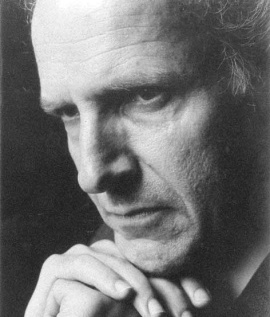
Klaus Börner (Fingering)
Prof. Klaus Börner, born in 1929 in Senftenberg/Niederlausitz, studied the piano at the School of Music in Weimar (1949 Privatmusiklehrerexamen) and at the Conservatoire de Lausanne (1952 Examen de virtuosité). Piano masterclasses with Alfred Cortot, Edwin Fischer and Wilhelm Kempff rounded off his musical education.
In 1956 he won 1st prize in the International Piano Competition in Barcelona and in 1959 was chosen to be part of the “Bundesauswahl junger Künstler des Deutschen Musikrates”. He taught the piano and teaching methodology at the Robert Schumann Conservatory in Düsseldorf and from 1969–1997 was Professor of Piano, Piano Pedagogy, and the Structure of Music in the Music Faculty at Johannes Gutenberg University in Mainz. He published the “Handbuch der Klavierliteratur zu vier Händen” (Atlantis Musikbuch-Verlag, Zürich). Klaus Börner died in Neuss on 20 November 2018.
Product Safety Informations (GPSR)

G. Henle Verlag
Here you can find the information about the manufacturer of the product.G. Henle Verlag e.K.
Forstenrieder Allee 122
81476 München
Germany
info@henle.de
www.henle.com
recommendations
autogenerated_cross_selling
Further editions of this title
Further editions of this title


